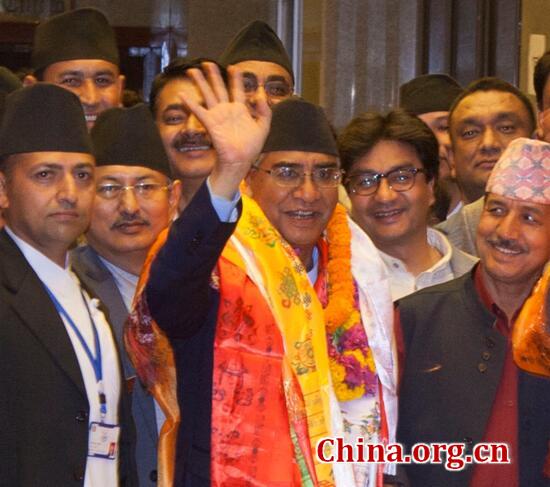Nepal's new PM Deuba walks a tightrope
- By Ritu Raj Subedi
 0 Comment(s)
0 Comment(s) Print
Print E-mail China.org.cn, June 20, 2017
E-mail China.org.cn, June 20, 2017
|
|
|
On the bumpy road: Prime Minister Sher Bahadur Deuba waves to lawmakers in the parliament upon being elected to the highest executive post on June 6. [Photo by Kavita Thapa/China.org.cn] |
After less than a week in office, new Prime Minister Sher Bahadur Deuba had to bite the bullet. His all-out efforts to rope agitating Madhesi parties into joining the second phase of the local election came a cropper. The Rastriya Janata Party Nepal (RJPN), which was formed with the merger of six Madhes-based parties, announced fresh protests to foil the elections slated for June 28.
The RJPN has been insisting on amending the new constitution as a precondition for taking part in the local polls but a statute amendment is not within the reach of the coalition government of the Nepali Congress and CPN-Maoist Centre.
Even though Deuba, also NC president, mustered close to two-thirds of votes in the leadership election held in the parliament on June 6, his government has chickened out of putting the amendment proposal to a vote for fear of a possible fiasco. Opposition parties rallying behind the CPN-UML are determined to scuttle it at all costs. They argue that it contains "anti-nationalistic" and "divisive" contents, and if it is endorsed by the House, it will put the nation on a slippery slope.
Deuba and his ally Pushpa Kamal Dahal Prachanda had entered into a three-point deal separately with the RJPN and the Federal Socialist Forum Nepal to win their support for his election to the post of PM. The accord promises to amend the statute but ironically does not include a provision to oblige the RJPN to join the election. Deuba had said that the amendment was unlikely before the election.
The government has also changed the electoral laws to facilitate the RJPN to register with the Election Commission. As the Madhesi force changed its tack against the election, the ruling parties have been left confounded. Many believe that the RJPN gave the ruling alliance the runaround as per a geopolitically motivated move to aggravate the transitional politics of Nepal.
The NC-Maoist Centre alliance came to power by replacing the KP Sharma Oli-led alliance with a sole objective of bringing the agitating parties on board the election. Maoist Centre Chair and former PM Prachanda passed the baton to Deuba as per their previous agreement.
While taking premiership for the fourth time in two decades, Deuba faces formidable challenges. He is saddled with holding the three-tier election – the remaining local election, and provincial and federal elections – within January of 2018, which holds the key to implementing the new constitution.
However, Deuba has another foremost task which is to rebuild his image tainted by several scandals committed by his governments in the past. He has been accused of serious anomalies which erode the sanctity of parliamentary democracy. He was blamed even by his party for handing over "democracy" to the erstwhile king amidst the deepening crisis fueled by the ruthless Maoist violence. He was later sacked by the king, terming him "incompetent."
King Gyanendra had almost vanished from the political scene after the abolition of the monarchy in 2008 but his sworn enemy Prachanda has now become his trusted friend in the government. Critics say that Deuba shows no hesitation to make any kind of compromise for the sake of power. The impeachment motion against former Chief Justice Sushila Karki was one of his latest controversial moves that greatly damaged his party in the first round of the local elections. He needs to rekindle the hope that the new alliance will fully abide by the rule of law, have an independent judiciary and fair election process.
Besides, he needs to prove his mettle on the foreign policy front, too. Considered to be a darling of the West, Deuba should justify with actions that Nepal truly believes in the nonalignment policy and respects the concerns of both neighbors. There is a looming doubt as to whether Deuba will delay or paralyze the landmark agreements reached with the northern neighbor, China. Nepal has recently signed the final MoU on the Road & Belt Initiative that seeks to boost cooperation and connectivity among the nations.
Deuba had already courted controversy by sharing a forum with the men of Dalai Lama in Goa of India last year. Though his party had already clarified that its president was duped by the organizer of the Goa conference, the Nepalese PM should work on enhancing mutual trust with China, as China is ready to support Nepal’s infrastructure development, connectivity and industrialization. The new PM must show ample sagacity to not let this big opportunity slip through his fingers.
Ritu Raj Subedi is an associate editor of The Rising Nepal.
Opinion articles reflect the views of their authors, not necessarily those of China.org.cn.







Go to Forum >>0 Comment(s)